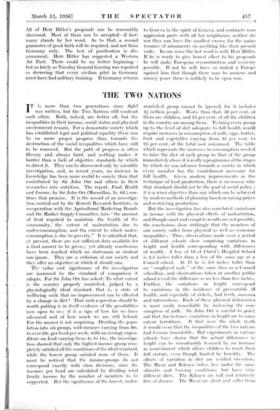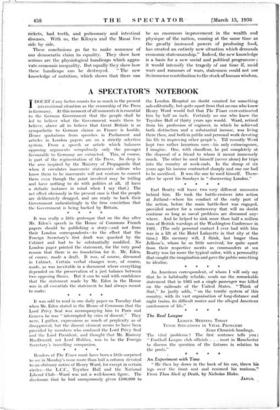THE TWO NATIONS
IT is more than two generations since Sybil was written, but the Two Nations still confront each other. Both, indeed, are better off, but the inequalities in their income, social status and physical environment remain. For a democratic society which has established legal and political equality there can be no more proper progress than towards the destruction of the social inequalities which have still to be removed. But the path of progress is often illusory and always hard, and nothing makes it harder than a lack of objective standards by which to direct it. They can be discovered only by scientific investigation, and, in recent years, no increase in knowledge has been more useful to society than that contributed by Sir John Orr and others in their researches into nutrition. The report, Food, Health and Income, by Sir John Orr (Macmillan, 2s. 6d.) con- firms that promise. It is the record of an investiga- tion carried out by the Rowett Research Institute, in co-operation with the Agricultural Marketing Boards and the Market Supply Committee, into "the amount of food required to maintain the health of the community, the extent of malnutrition due to under-consumption, and the extent to which under- consumption is due to poverty." It is admitted that, at present, there are not sufficient data available for a final answer to be given ; yet already conclusions have been reached which no statesman or student can ignore. They arc a criticism of our society and they offer an objective at which it should aim.
The value and significance of the investigation are increased by the standard of comparison it adopts. For Sir John Orr has asked : To what extent is the country properly nourished, judged by a physiologically ideal standard, that is, a state of wellbeing such that no improvement can be effected by a change in diet ? That such a question should be worth putting is in itself evidence of the possibilities now open to us ; it is a sign of how far we have advanced and of how much we are still behind. For the answer is not surprising. Dividing the popu- lation into six groups, with incomes varying from 10s. to over 45s. per head per week, with an average expen- diture on food varying from 4s. to 14s., the investiga- tion showed that only the highest-income group com- pletely satisfied all the conditions of the ideal standard, while the lowest group satisfied none of them. It must be noticed that the income-groups do not correspond exactly with class divisions, since the incomes per head are calculated by dividing total family income by the number of members to be supported. But the significance of the lowest, under- nourished group cannot be ignored, for it includes 4.1 million people. Worse than that, 50 per cent. of them are children, and 25 per cent. of all the children in the country are among them. To bring every group up to the level of diet adequate to full health would require increases in consumption of milk, eggs, butter, fruit and vegetables varying from 1.2. per cent. to 25 per cent. of the total now consumed. The table which represents the increases in consumption needed to raise the diet of each group to that of the group iiiimediately above it is really a programme of the stages by which we can advance towards a society in which every member has the nourishment necessary for full health. Given modern improvements in the technique of food production, there is no reason why that standard should not be the goal of social policy ; it is a wiser objective than any which can he achieved by modern methods of planning based on raising prices and restricting production.
But the investigation has also correlated variations in income with the physical effects of malnutrition, and though exact and complete results arc not possible, the conclusions show strikingly that the members of our society suffer from physical as well as economic inequalities. Thus, observations made over a period at different schools show surprising variations in height and health corresponding with differences of wealth. A boy of 13 at Christ's Hospital School is 2.4 inches taller than a boy of the same age at a Council school. At 17 he is 3.8 inches taller than an " employed male " of the same class as a Council schoolboy, and observations taken at another public school reveal the difference as no less than live inches. Further, the variations in height correspond to variations in the incidence of preventable ill health, and especially of rickets, bad teeth, anaemia and tuberculosis. Each of these physical deficiencie8 is most easily remediable by increasing the con- sumption of milk. Sir John Orr is careful to point out that, for instance, variations in height are to some extent hereditary. If that were the whole truth it would seem that the inequalities of the two nati:nis had become immutable. But experiments in various schools have shown that the actual differences in height can be considerably lessened by an increase in nourishment which allows children to reach their full stature, even though limited by heredity. The effects of variation in diet arc verified elsewhere. The Masai and Kikuyu tribes live under the same climatic and housing conditions, but have very different diets. The Kikuyu arc tall and relatively free of disease. The Masai are short and suffer from tickets, bad teeth, and pulmonary and intestinal diseases. With us, the Kikuyu and the Masai live side by side.
These conclusions go far to make nonsense of our democratic claim to equality. They show how serious are the physiological handicaps which aggra- vate economic inequality. But equally they show how these handicaps can be destroyed. " The new knowledge of nutrition, which shows that there can be an enormous improvement in the wealth and physique of the nation, coming at the same time as the greatly increased poweis of producing food, has created an entirely new situation which demands economic statesmanship." Indeed, the new knowledge is a basis for a new social and political programme ; • it would intensify the tragedy of our time if, amid wars and rumours of wars, statesmen could not use its immense contributien to the stock of human wisdom.















































 Previous page
Previous page